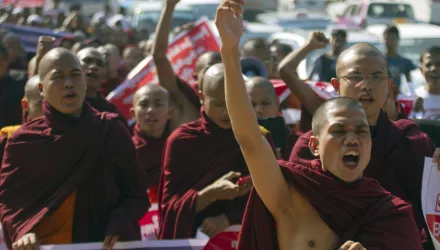BEIRUT -- The Israeli elections Tuesday are expected to usher in a Likud-led right-of-center coalition. Regardless of the final result (I write this Tuesday morning, as the voting begins), one thing is already clear: Whoever wins, the chances of a negotiated peace based on a two-state solution are slim, and becoming more difficult every year.
But they are not impossible for two main reasons. The difficulties that plague peace prospects today are all man-made ones that can just as easily be reversed and removed by new men and women leaders who act with courage and wisdom. And, the resort to violence by all parties has emphasized the limits of militarism, and clarified that only a political resolution will bring peace and security. Neither side will surrender, or be eliminated.
Here is the very complex and challenging political context in which we operate today: The two-state solution is difficult but still possible, the one-state solution is often proposed by many Arabs but is not realistic in the near future, and the current configuration on the ground is in fact a three-state solution: Israel, Gaza and the West Bank.
But the full truth is even more complex.
As my friend -- the respected Palestinian scholar and analyst -- Ahmad Khalidi described it in a recent conversation, we now operate in the shadow of a four-state solution: Gaza, the West Bank, centre-left Israel that accepts a two-state solution, and right-of-center settler-colonial Israel that demands permanent Jewish control of much of the West Bank, East Jerusalem and the Golan Heights.
The entire Israeli political system has steadily shifted to the right in the past 30 years -- since Likud and Menachem Begin won power in the late 1970s. Today even the so-called centrists and moderates, like Kadima Party leader Tzipi Livni and Labor Party Ehud Barak, would be classified as out-of-control rightwing hardliners in any other, normal government system in the world -- in view of their vicious warmongering in the recent attack on Gaza.
It is telling testament to the condition of the Israeli political system that many leaders and even ordinary soldier-citizens now worry about traveling abroad for fear of being charged with war crimes, due to their disproportionately barbaric attacks against the civilian population of Gaza. Meanwhile, the center of gravity of Palestinian politics has shifted to the Hamas-Islamist-dominated right. The Israeli and Palestinian transitions, however, cannot be equated as mirror images of each other.
The Israelis occupy, colonize and annex Palestinian land, jail over 10,000 Palestinian men and women (included elected members of parliament) who have not been charged in most cases, and routinely attack Palestinian areas that are largely inhabited by unarmed civilians. The Palestinians believe they are fighting a defensive war of resistance against an Israeli foe that colonizes or strangulates them, and refuses to abide by international norms that demand the creation of a sovereign Palestinian state and the just resolution of the refugee issue.
The shift to the right and the sharp polarization in Israeli politics means the country is defined by two very different forces that cannot easily coexist while "security" concerns keep pushing the center of gravity of society, psyche and politics to the right. Some among the right are outright racists and skinhead chauvinists. But most Israelis are more reasonable, yet they gravitate to the right because they feel more secure there.
This is a core dilemma for Israel as a whole: The more they rely on military force to kill and control Palestinians and other Arabs, the greater resistance they elicit from the Arabs, and the less secure all Israelis feel. Israelis broadly remain blind to the need to find true peace and security by coming to terms with Palestinian nationalism, and addressing their share of the blame for the dismemberment of Palestinian society and the birth of the refugee problem in 1947-48.
The militant and racist right in Israel is the fourth state in the four-state solution that looms as one ugly outcome of current trends: A Hamas-led state in Gaza, a Fateh-led state in pockets of the West Bank in between Israel's Apartheid-like colonies and roads; a rightwing, militant, super Jewish-nationalist Israeli settler-colonial state in the West Bank, Golan Heights and greater Jerusalem; and, a Labor-left-led secular Jewish state in greater Tel Aviv and adjacent regions.
This is the tragedy of a land once defined by a pluralistic indigenous population of Christians, Jews and Moslems, now on the verge of becoming divided into four parts, two of which enthusiastically embrace the ethos of the warrior-nationalist.
Depressing as this is, we must remember that it is not an act of God or nature, but rather the work of stupid, irresponsible men and women on all sides. It can be reversed with the advent of wiser and more sensible leaders. In this land of miracles, everything is possible.
Rami G. Khouri is Editor-at-large of The Daily Star, and Director of the Issam Fares Institute for Public Policy and International Affairs at the American University of Beirut, in Beirut, Lebanon.
Khouri, Rami. “Here Comes the Four-State Solution.” Agence Global, February 11, 2009



